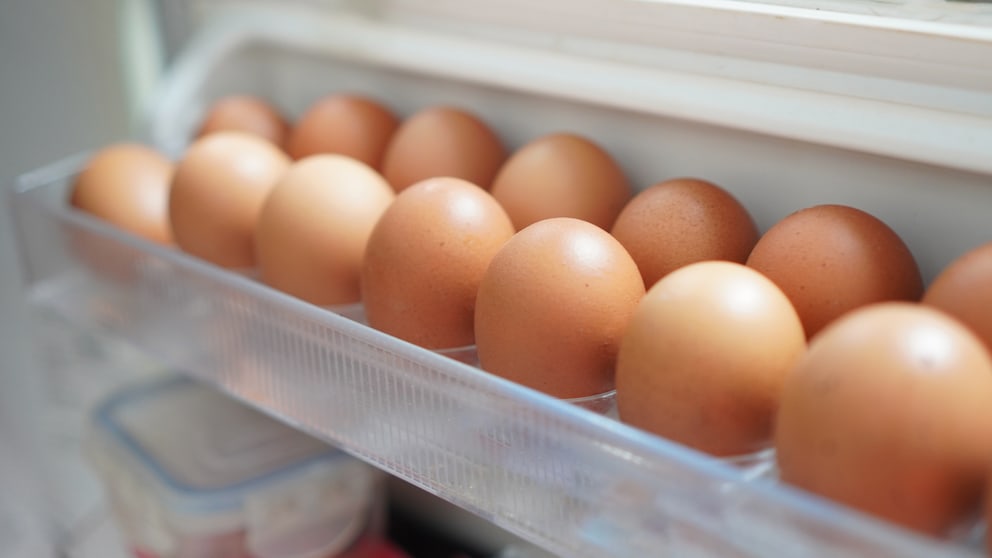February 24, 2025, 8:19 pm | Read time: 6 minutes
A classic at the breakfast table and a quick protein snack for athletes: the egg. It comes with a high protein quality and a good portion of vitamin A and its precursors. But where in the kitchen is it best stored so that it keeps for a long time and, above all, so that it tastes good? Experts reveal the answer.
Fried, for baking cakes, or hard-boiled — eggs are a real all-rounder in the kitchen. It’s not for nothing that per capita consumption in Germany in 2023 was an impressive 236 eggs!1 However, opinions differ when it comes to storage. Some put the carton in the cupboard — after all, it was on the shelf in the supermarket without being refrigerated. Others use the fridge — after all, it has a special compartment for eggs! FITBOOK, together with nutrition expert Gabriele Kaufmann from the Federal Center for Nutrition (BZfE) and Claudia Boehnke from the Lower Saxony State Office for Consumer Protection and Food Safety (LAVES), sheds light on the matter.
Overview
Information on Egg Cartons Has Changed
You may remember that there used to be two different dates on egg cartons. One was the well-known best-before date (BBD). The other was the “cool from” date, which indicated the day after which the eggs should be refrigerated. This is because eggs have a natural membrane that protects them from bacterial penetration. As long as this membrane remains intact, eggs can be stored unrefrigerated for up to three weeks. However, around 18 days after laying, this natural barrier begins to become more permeable. This makes it easier for bacteria to penetrate. Suppliers, therefore, had to store eggs under refrigeration from this date onward.2
Barrier Can Be Compromised Even Earlier
The shell of the egg can easily suffer minor damage during transport, while being placed on the supermarket shelf, or on the way home from shopping. This leads to the natural membrane becoming permeable at an earlier stage. According to studies, the fewest germs develop at a storage temperature of four to six degrees Celsius. This is why there is now a “refrigeration label” on egg cartons, which recommends that consumers keep eggs refrigerated after purchase.3
So Why Do Eggs Remain Unrefrigerated in the Supermarket?
Temperature fluctuations can also compromise the egg’s natural protective barrier. Once eggs are in the fridge, they can no longer be stored at room temperature. For this reason, supermarkets typically display eggs without refrigeration. Otherwise, they would have to guarantee a continuous cold chain to avoid temperature fluctuations. In practice, this can only be achieved with a great deal of effort when loading, unloading, and sorting the eggs. The hygiene regulations also stipulate that retailers should only store eggs at a “preferably constant temperature,” which best ensures their “hygienic condition.” In addition, they must have sold the eggs within 28 days of laying.
Watch Out, Unpleasant Taste! Experts Explain What Is Important When It Comes to Storage
To be on the safe side, it’s best to refrigerate eggs right after purchasing them. Normally, however, nothing will happen if they are stored unrefrigerated. If you belong to “Team Fridge,” you may be familiar with another unpleasant phenomenon that is far removed from spoiled eggs: undesirable changes in the taste of the eggs in the fridge. FITBOOK spoke to two experts about how these changes occur — and how to avoid them.
Gabriele Kaufmann from BZfE explains: “The natural protective layer of eggs is permeable. Therefore, odors and flavors can also be absorbed.” Claudia Boehnke from LAVES shares exactly what happens in the egg: “Aromas are small, volatile molecules that can diffuse through the eggshell. As eggs themselves have no distinct odor and a mild, pleasant taste, they are sensitive to odor and taste influences of any kind.”
Boehnke explains that the LAVES has already carried out tests on this. “Some time ago, we had fresh egg samples that were stored together in a closed carton with flavorings, and then we smelled and tasted clearly the respective flavors, especially in the egg yolk, e.g., orange peel or coffee. All foods that smell intensely have strong aromas.” Kaufmann adds that foods such as smoked fish, sausage, and dishes with garlic have no place next to eggs if you want to avoid flavor experiments.
Conclusion: When storing eggs in the fridge, you should always make sure that they are not placed next to strong-smelling foods! Kaufmann also points out that it is helpful to place such foods in the fridge in airtight packaging. This way, the aromas have no chance of migrating into the eggs.

Watch Out! Lose Weight Thanks to Spaghetti? What Konjac Noodles Can Do

Instead of a Steroid Injection Man Eats 900 Eggs to Build Muscle — How an Expert Assesses the Experiment

Nutrition tips from an expert 5 healthy snack recipes that keep blood sugar levels down
Does It Matter Whether the Eggs Are Raw or Hard-Boiled?
According to Kaufmann, hard-boiling does not protect eggs from foreign odors. This is because, as we have already learned, raw eggs have a permeable shell. Moreover, the natural protective layer of boiled eggs is destroyed by the cooking process. Cracks in the shell can also facilitate the process. Boehnke suspects that the effect could at least be less pronounced in cooked eggs: “We (the LAVES, editor’s note) consider cooked eggs to be less sensitive, but we have no reliable information on this.”

